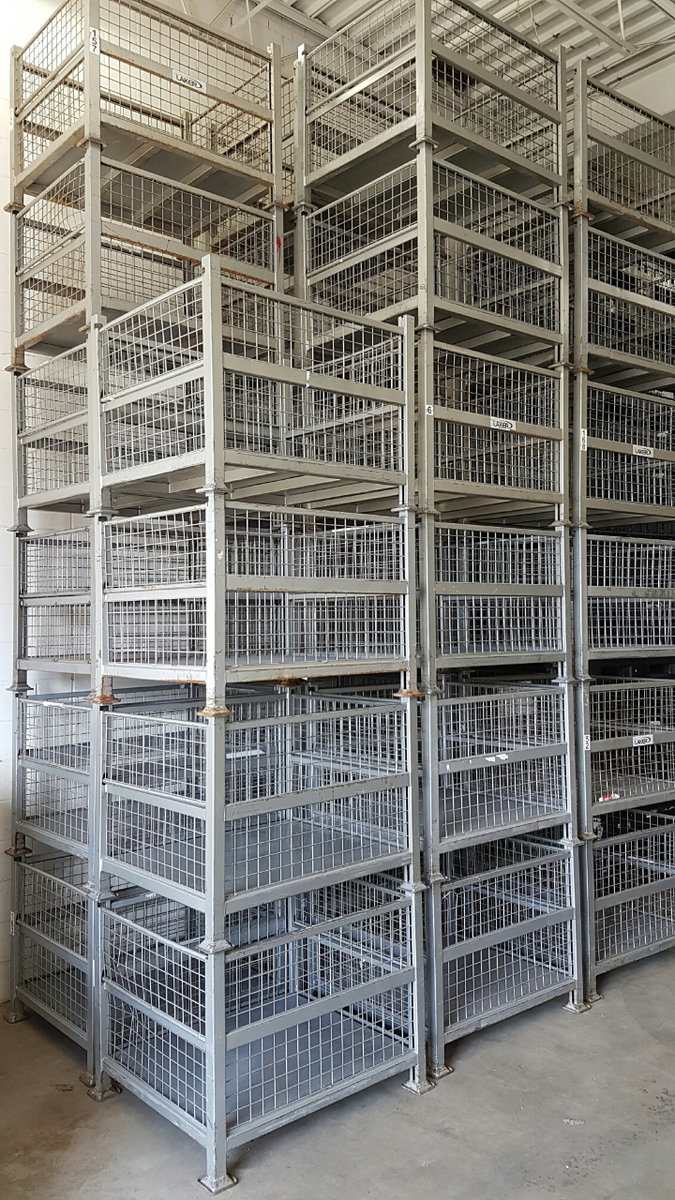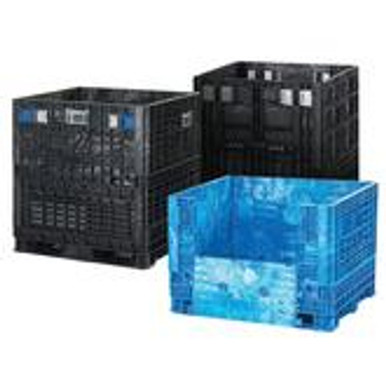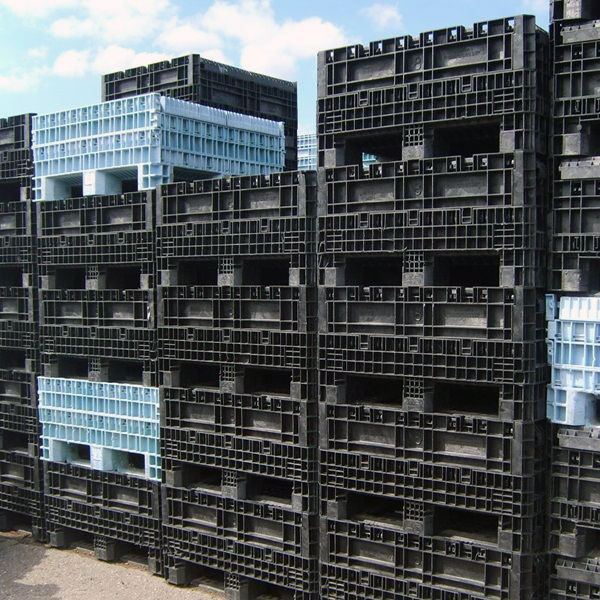Why Bulk Containers Are Essential for Cost-efficient and lasting Transport
Bulk containers play a necessary duty in modern-day logistics. They facilitate the efficient activity of large quantities of products, thus maximizing transport processes. This approach not only reduces prices however additionally lessens ecological influence through reduced emissions and waste generation. As industries look for more lasting techniques, the fostering of bulk containers is coming to be increasingly considerable. What implications does this change hold for future logistics and supply chain management?

The Benefits of Making Use Of Mass Containers in Logistics
Mass containers transform logistics by enhancing efficiency and sustainability. These containers enable the transportation of big quantities of goods in a single journey, substantially minimizing the number of trips needed. This not only improves procedures however additionally lessens labor expenses associated with handling, filling, and discharging. Additionally, mass containers are designed to optimize space utilization within transportation lorries, making certain that even more products can be delivered at the same time.
The standardization of mass containers likewise streamlines the logistics procedure. With uniform measurements, they can be easily stacked and kept, causing enhanced storage facility monitoring. Mass containers commonly feature resilient products that safeguard components from damages throughout transportation, consequently decreasing item loss and boosting total dependability. Therefore, companies can experience improved supply chain performance, eventually resulting in boosted profitability and consumer satisfaction. This combination of aspects makes bulk containers a critical asset in contemporary logistics.
Ecological Effect: Minimizing Waste and Carbon Impact
As markets progressively focus on sustainability, the fostering of bulk containers has actually emerged as a key approach for lowering waste and reducing carbon impacts. These containers decrease the use of packaging materials, such as boxes and plastic, thereby notably lowering general waste generation. By settling shipments, bulk containers boost transportation efficiency, enabling for even more items to be delivered per journey. This reduction in journeys straight correlates with reduced greenhouse gas emissions, adding to a smaller sized carbon impact.
Mass containers can commonly be recycled or recycled, even more alleviating ecological influence. The longevity of these containers assurances they can endure numerous transport cycles, minimizing the requirement for single-use choices. refurbished bulk containers. By streamlining logistics and promoting effective resource usage, mass containers not just support lasting practices however additionally urge industries to straighten with global environmental objectives. Inevitably, their application reflects a dedication to environmental stewardship and liable source monitoring
Expense Cost Savings: Exactly How Mass Containers Lower Transport Expenditures
While numerous firms seek means to enhance their lower line, the use of bulk containers offers a significant chance for lowering transport expenses. Bulk containers maximize the volume of items delivered, permitting services to ship bigger quantities simultaneously. This performance lowers the variety of journeys called for, directly decreasing fuel prices and minimizing labor expenditures associated with loading and dumping.
Furthermore, bulk containers commonly include streamlined layouts that enhance space application within transportation automobiles. This implies less voids, bring about a lot more reliable use available ability. The durability of bulk containers can reduce the danger of item damage during transportation, guaranteeing and minimizing losses that even more products get here intact.
Enhancing Supply Chain Performance With Bulk Storage Solutions
Mass storage space options play a necessary role in boosting supply chain efficiency by enhancing supply management. By settling products into less, larger containers, services can considerably reduce managing costs related to constant transfers and handling. This structured approach allows for much better tracking and monitoring of stock, ultimately bring about enhanced functional efficiency.
Streamlined Stock Administration
Effective supply administration is important for maximizing supply chain operations, specifically when companies embrace bulk storage space options. These remedies enable companies to keep higher stock levels while minimizing the regularity of replenishment. By settling materials into mass containers, firms can enhance their stock processes, reducing the intricacy connected with tracking multiple smaller sized plans. This method promotes accurate stock matters and enhances forecasting accuracy, enabling more enlightened decision-making. Furthermore, mass storage space solutions streamline storehouse company, making it easier to find and accessibility items when needed. As a result, organizations can attain a more reliable stock turn over price, eventually boosting general supply chain efficiency and minimizing the chance of stockouts or overstock scenarios.

Lowered Handling Prices
The execution of mass storage space options not only simplifies inventory monitoring yet also considerably reduces handling costs throughout the supply chain. By combining products into bulk containers, business lessen the requirement for frequent handling and transfer between different storage space news and transport systems. This method lowers labor expenses linked with loading, discharging, and moving smaller sized packages. Furthermore, mass storage space decreases the frequency of shipments, causing lower transportation costs and reduced fuel usage. Consequently, services can optimize their logistics operations, permitting for an extra efficient allocation of sources. Eventually, minimized handling expenses contribute to improved overall supply chain efficiency, fostering an environment that supports both sustainability and economic feasibility.

Convenience of Mass Containers Throughout Various Industries
Numerous sectors have distinctive requirements for transport and storage space, bulk containers have actually emerged as a flexible solution that meets a large array of demands. These containers, varying from large bins to specialized storage tanks, can fit varied products, including liquids, granules, and powders. In the agricultural industry, bulk containers promote the transportation of grains and fertilizers, while the food and beverage sector uses them for ingredients and finished products. The chemical industry relies on bulk containers for safely moving dangerous materials, making certain conformity with safety and security laws. Additionally, construction companies profit from mass containers for transporting accumulations and various other products. Their flexibility includes different modes of transport, including trucks, ships, and trains, enhancing logistical efficiency. This convenience not just simplifies procedures across different industries but likewise promotes sustainability by lowering packaging waste and maximizing area in transit. As a result, bulk containers play an important duty in contemporary supply chain administration.
Future Patterns in Bulk Container Use and Sustainability
The future of mass container usage is significantly shaped by innovative products growth that enhances sustainability. In addition, automation in logistics guarantees to improve procedures, minimizing waste and improving performance. Accepting round economic situation practices will certainly even more reinvent how bulk containers are created, used, and recycled, cultivating an extra lasting transportation landscape.
Ingenious Materials Advancement
As industries significantly prioritize sustainability, cutting-edge materials growth in bulk containers emerges as a substantial element in boosting environment-friendly transport services. Scientists and suppliers are exploring naturally degradable plastics, recycled compounds, and lightweight metals to decrease ecological influence. These products not just lessen waste yet also enhance gas performance by decreasing the overall weight of containers. Furthermore, developments in smart materials, which can adapt to differing problems, boost the resilience and performance of mass containers. The combination of these ingenious products aligns with round economy principles, promoting reuse and recycling. As the need for lasting techniques expands, the growth of such products will play a vital role fit the future of bulk container usage in logistics and transportation.
Automation in Logistics
Substantial developments in automation are positioned to change logistics and the usage of bulk containers, enhancing sustainability in transportation. Automated systems, including drones and autonomous vehicles, are streamlining the motion of bulk containers, minimizing the reliance on standard fuel-powered transportation. These technologies enhance routing and filling procedures, decreasing vacant miles and boosting fuel efficiency. In addition, automated supply monitoring systems boost monitoring and tracking of bulk containers, guaranteeing much better resource allocation and lowered waste. The integration of the Internet of Things (IoT) allows real-time information evaluation, allowing proactive decision-making that straightens with sustainability goals. As automation remains to advance, it is expected to drive further innovations in mass container usage, inevitably supporting more lasting logistics practices and reducing the ecological influence of transportation.
Round Economic Climate Practices
Developments in automation are establishing the stage for a more incorporated Homepage approach to round economic climate techniques in the domain of mass container usage. As markets significantly accept sustainability, bulk containers are being designed for durability and reusability. This shift not only decreases waste but additionally enhances source efficiency. Business are taking on methods such as closed-loop systems, where used containers are accumulated, refurbished, and reintroduced right into the supply chain. Additionally, wise modern technologies track container life cycles, promoting much better monitoring and lowering environmental influence. The partnership between producers, logistics providers, and end-users is essential in developing criteria for sustainable container usage. used bulk containers. Future fads show an expanding focus on materials that are eco-friendly and recyclable, additional reinforcing the circular economic situation's principles in bulk transport

Frequently Asked Inquiries
What Materials Are Bulk Containers Generally Made From?
Bulk containers are usually created from long lasting materials such as high-density polyethylene, steel, cardboard, and aluminum. These materials provide next convenience, strength, and security, making them suitable for transporting various products in various sectors effectively.
Just how Do I Select the Right Dimension Mass Container?
Picking the ideal dimension bulk container involves examining the quantity of products to be transferred, thinking about managing equipment compatibility, and appraising storage area demands. Appropriate dimension assurances effectiveness in transportation and lessens waste throughout delivery.
Are Mass Containers Reusable or Recyclable?
Bulk containers are typically reusable, developed for several trips, boosting sustainability. Numerous can also be reused, relying on the materials made use of. Selecting recyclable options additionally minimizes and supports environmental objectives waste in transport practices.
What Safety And Security Laws Apply to Bulk Container Transportation?
Safety laws for mass container transport include conformity with the Department of Transport guidelines, correct labeling of hazardous materials, structural integrity assessments, and adherence to weight restrictions to ensure safe handling and protect against crashes during transportation.
How Can Organizations Shift to Making Use Of Bulk Containers Properly?
Services can alter to bulk containers by reviewing present logistics, training staff on handling, purchasing suitable tools, enhancing supply management, and collaborating with providers to assure compatibility and efficiency throughout the supply chain.
As sectors progressively prioritize sustainability, the fostering of bulk containers has actually emerged as a crucial approach for reducing waste and decreasing carbon footprints. By consolidating products into bulk containers, business can improve their supply processes, lowering the intricacy linked with tracking several smaller packages. As industries significantly prioritize sustainability, ingenious materials growth in mass containers arises as a substantial aspect in enhancing environment-friendly transportation options. Automated systems, including drones and autonomous cars, are streamlining the movement of bulk containers, reducing the reliance on traditional fuel-powered transport. Furthermore, automated inventory monitoring systems improve tracking and tracking of bulk containers, guaranteeing far better source allocation and decreased waste.